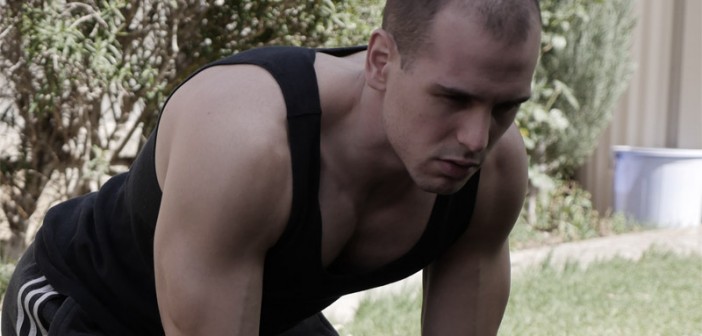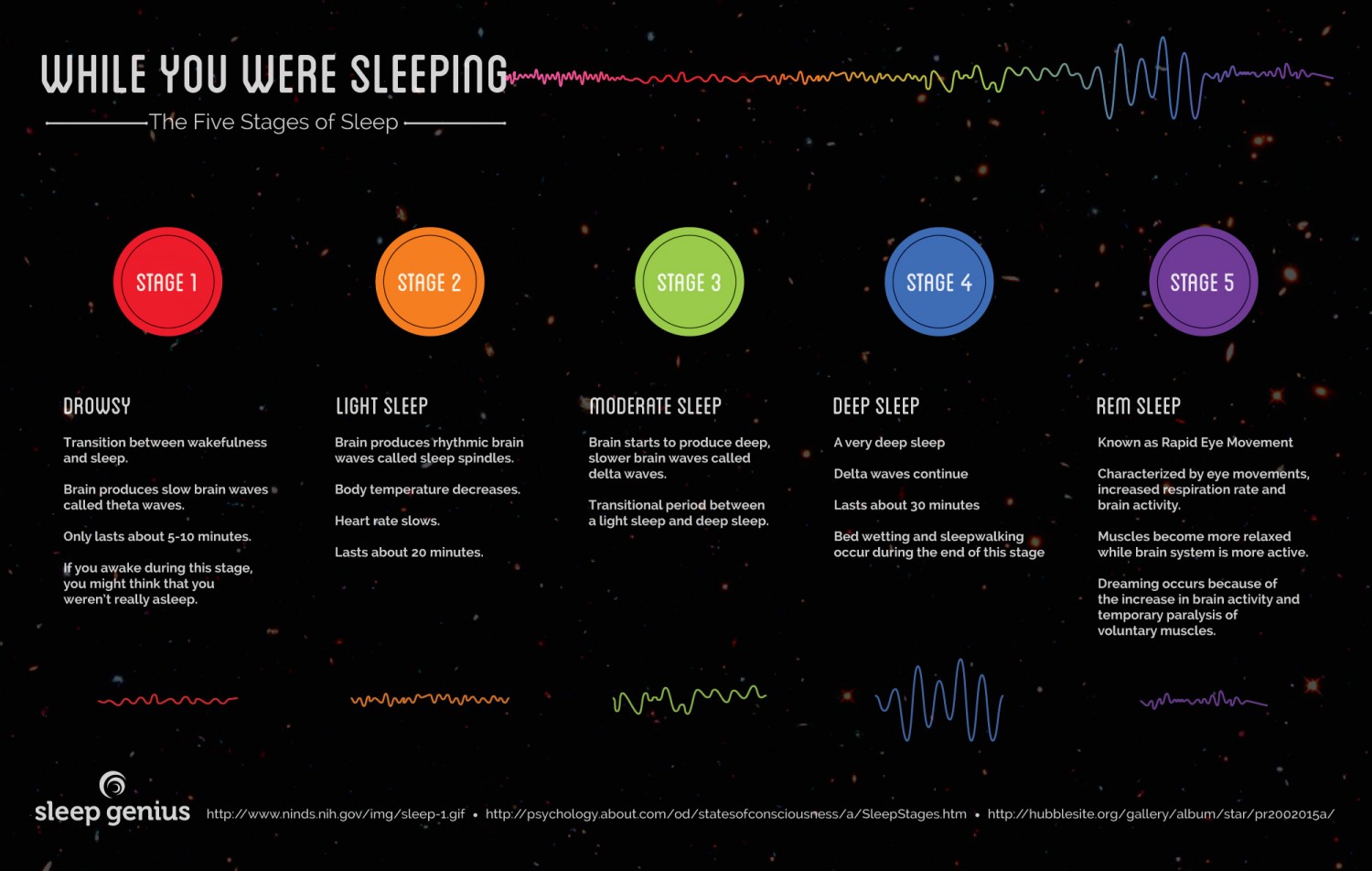We’ve all experienced sleep deprivation. The feeling of lethargy, emotional heaviness and inability to concentrate has a direct correlation with mental and physical ineptitude.
Put simply, we’re not performing as well as we know we can and it can be incredibly disheartening. You may even begin to question your ability to complete tasks to a high standard which is antithetical to your success at work and in business.
If you’re even slightly concerned about your physical well-being, it’s in your best interest to educate yourself on the role sleep plays for this aspect of your health.
Let’s begin.
The Five Stages of Sleep
Before I delve deeper, lets take a moment to familiarize ourselves with what’s happening to us before we enter the joyous state of deep slumber. As illustrated in the below infographic, there are five unique stages; each characterized by different types of brain waves emitted at varying frequencies.
In a typical evening (for the fortunate non-insomniacs among us) we’ll progress from a Drowsy state to an eventual Rapid Eye Movement (REM) state. Slow delta waves are produced in the latter stage, relaxing the muscles and facilitating our dreaming process due to an increase in brain activity.
In an ideal world, we would all be spending the majority of our sleeping hours in REM sleep. Unfortunately, age works against us, reducing the amount of REM sleep experienced as we grow older. Adults will be in the REM state about 20% of the time compared to infants and children where this number is at roughly 50%.
Oh, and that sudden full body twitch we get when visualizing ourselves falling or tripping over right before we’re asleep? That occurs at Stage 1 and is called Hypnic Myoclonia, more commonly known as a Hypnic Jerk.
The Physical Effects of Sleep Deprivation
Now that we understand the five sleep cycles, let’s delve deeper. The following are well-known physical side effects synonymous with inadequate sleep.
Weight Gain
Unless you’re an off-season “bulking” bodybuilder, skinny teenager or polar bear priming for a long period of hibernation, weight gain is a facet of life we wish we could avoid. This is one of the first steps to a marked deterioration of physical performance.
I can hear you now… “But if I just eat like I normally do when I haven’t slept, I should be fine, right?”.
Theoretically, yes. However, it’s not going to be easy because your body is actively working against you.
When you’re sleep deprived, the ability of your body to regulate appetite and metabolize glucose (“energy”) is hampered. This will trigger a raise in insulin and cortisol levels. The former triggers a higher degree of fat retention in your body and the latter is also known as the “stress” hormone.
This is true for all of us, regardless of gender.
I can say without doubt, that I’m certainly more highly strung and irritable when I haven’t slept. Elevated levels of cortisol can really kick my ass and I’d wager it does the same to you.
Insufficient sleep is also associated with lower levels of leptin (a hormone that alerts the brain when it has had enough food) and higher levels of ghrelin (a biochemical that stimulates appetite). As a result, poor sleep may lead to food cravings even after you have eaten an adequate number of calories. When you’re tired, you will be more likely to eat unhealthy foods to help satisfy your cravings or give you a quick energy boost. – Men’s Fitness
The above quote undoubtedly rings true for me.
When I’m sleep deprived, I find myself craving for snacks even though I may have just eaten a substantial meal. It normally takes a special kind of mental fortitude to fight against the body trying to usurp your willpower and relentlessly plow through large quantities of your favorite junk food. And this is before the difficulty has been compounded by sleep deprivation.
If you’re chronically stressed and have recently noticed weight gain, questioning your sleeping habits should be the first action point you take.
Increased Risk of Injury
In March 2014, a study was published by Milewski et al. that investigated sleep as a risk factor for injury in adolescent athletes.
A total of 112 high school male and female athletes were observed over a 21 month period and were initially asked to fill out a ten question survey. For brevity, I’ve listed three of the questions below:
- How many weeks a year do you participate in organized sports?
- How long is each training session?
- How many hours of sleep on average do you get per night?
Of the ten questions, the amount of sleep per night was concluded to be the strongest predictor of injury; where an injury was defined as a visit that required a visit to the athletic trainer’s room for evaluation and treatment.
Interestingly, it was observed that 65% of athletes who reported sleeping fewer than eight hours were injured compared with 31% of athletes who reported sleeping eight or more hours per night.
Other factors which increased rate of injury to a lesser extent included age (older students were more likely to sustain an injury), hours per week involved in sport and involvement in strength training.
On the flip side, this same study references an earlier experiment conducted by Mah et al. involving collegiate basketball players.
Basketball players who increased their sleep to at least 10 hours were able to sprint faster, shoot more accurately, and had improved subjective ratings of physical and mental well-being. – Mah et al. (July 2011)
That’s certainly an interesting result.
We may not have the luxury of sleeping at least 10 hours a night, however if I played Basketball even at a recreational level, the benefits of getting more sleep would undoubtedly have positive impact on my game.
It’s here that I’ll redirect the focus back to you and me.
The results discussed above occurred with test subjects who were considered athletes. This implies that an active lifestyle and a consistent training regimen is maintained by all involved.
If sleep can affect athletes in this way, how will those of us working in an office fare physically with inadequate sleep and a sedentary lifestyle?
We already know that blood circulation issues and Deep Vein Thrombosis (blood clotting in large veins) are possible side effects of being a sedentary employee. Higher blood levels of sugar and fats, larger waistlines and metabolic damage also pose a risk.
Now what happens if you take a sleep deprived person like this who wants to become more active and prematurely thrust them into a high intensity fitness class where complex compound movements are performed at a rapid rate?
Disaster.
Well… perhaps not for the wallets of the Doctors, Physiotherapists and Surgeons which will reap the financial rewards by keeping you as a medium to long-term patient.
If you’re a sleep deprived office worker wishing to become more physically active through sports or strength training, I’d recommend placing a premium on your sleeping hours to avoid injury and the physical side effects outlined above.
Reduced Testosterone
Testosterone levels plummet with a lack of sleep and so does interest in sexual activity for both men and women. This spells trouble for amorous couples or overworked single men and women wishing to meet new people.
For men, experiencing low testosterone is akin to losing the driving force of what it is to be a man. Fatigue, low energy and a general lack of motivation are common side effects. The ability to act decisively and with conviction will be hampered as you slowly metamorphose from a proactive person who “makes things happen” to a passive bystander, lethargically watching on.
If you’re a male and your training routine is centered around building strength and packing on as much muscle mass as possible, you’re shooting yourself in the foot if a reasonable sleeping routine is not being adhered to.
At least 15% of the adult working population in the US gets less than 5 hours of sleep a night, and suffers many adverse health effects because of it. This study found that skipping sleep reduces a young man’s testosterone levels by the same amount as aging 10 to 15 years. – University of Chicago Medical Center, June 2011.
For the young men in their mid-twenties involved in this study, this reduction in testosterone levels was observed after only one week of sleeping under five hours a night.
Yes, one week is all it takes.
However, it’s not necessarily what you’re doing while you’re not sleeping which may show low testosterone.
Have you ever been told by a partner or friend that you snore loudly during your sleep?
If so, you could be suffering from obstructive sleep apnea which is an inability to breathe properly during sleep. This is one known indicator of low libido as reported by a 2002 study of men at the Technion Sleep Laboratory in Israel. It was found that nearly half of those who suffered from severe sleep apnea also secreted abnormally low levels of testosterone during the night.
After learning this, I now find it hard to look at loud snorers the same way.
For women, the effects of reduced testosterone are not so dire but still play a part. Side effects include mood swings, hormonal imbalances, and an increased risk of osteoporosis (degradation of bone density). A reduced ability to manage pain levels is also prominent, particularly with women on birth control medication that have an imbalance between their levels of testosterone and estrogen.
Now that you know a bit more about the physical effects of sleep deprivation, it’s up to you to make a decision.
Many lifestyle factors exist that may inhibit your ability to prioritize sleep such as working hours, family time and community involvements. However, if you’re not being honest with yourself by saying “I’ve done everything in my power to sleep as much as I can to optimize my physical performance” then you may be putting yourself at risk to the many physical side effects listed above.
Now go and get more sleep!
Read next: My follow up post on the mental effects of sleep deprivation.


